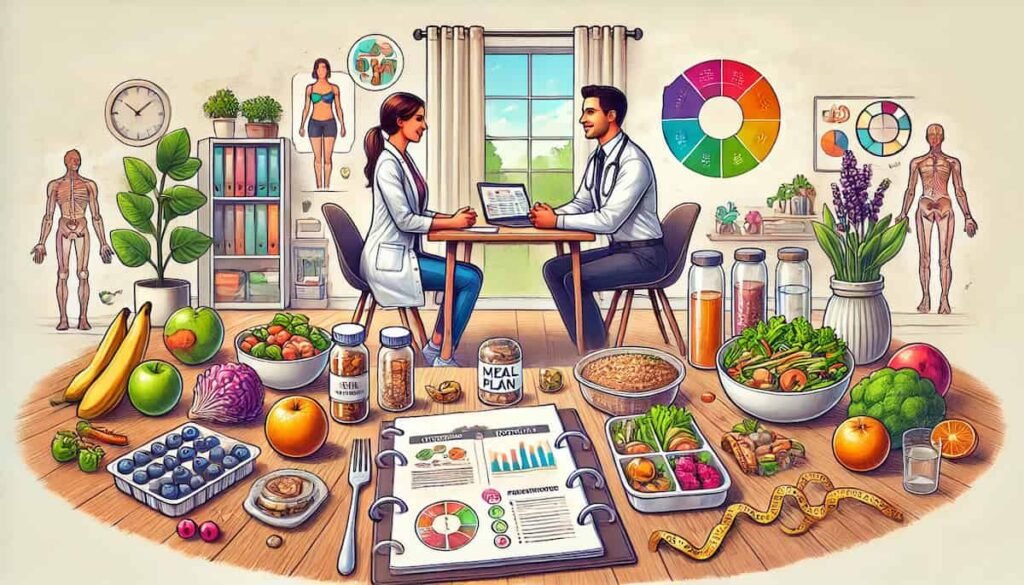Trying to lose weight can feel overwhelming. With endless diets, calorie-tracking apps, and conflicting advice everywhere, it’s easy to feel stuck or confused about where to begin.
This is where working with a dietitian for weight loss can make all the difference. Whether you’re just starting out or you’ve hit a plateau, a dietitian offers expert guidance tailored to your unique needs and lifestyle.

If you’ve ever wondered what role a dietitian plays in weight loss or how they can help, this guide will walk you through the benefits, what to expect, and how to get started with one.
What Does a Dietitian Do for Weight Loss?
A dietitian isn’t just about handing you a meal plan. They focus on the big picture—your eating habits, lifestyle, and health goals—and create a personalized approach that fits your needs.

Here’s how they can help:
- Develop a Custom Plan: Everyone’s body is different, and what works for one person might not work for another. A dietitian creates a meal plan specifically designed for your preferences, metabolism, and goals.
- Address Emotional Eating: Many people struggle with emotional eating, whether it’s stress-snacking or binge eating. A dietitian helps you identify these triggers and develop healthier coping strategies.
- Provide Long-Term Support: Losing weight isn’t a quick fix. Dietitians offer ongoing guidance and adjustments to your plan, ensuring you stay on track and motivated.
- Accountability: Knowing you have regular check-ins with a professional can boost motivation and help you stay consistent.
- Navigate Medical Conditions: If you have conditions like diabetes or high blood pressure, a dietitian can create a weight-loss plan that improves both your weight and overall health.
Benefits of Seeing a Dietitian for Weight Loss
You might wonder why seeing a dietitian is better than trying to lose weight on your own.

Here are a few reasons:
Personalized Plans Based on Science
Dietitians don’t rely on fad diets or trends. They use scientific research to guide their recommendations, ensuring you’re getting the nutrients you need while losing weight sustainably. Read our guide to 1200-Calorie Diet.
A Focus on Healthy Habits, Not Restrictions
One of the best things about working with a dietitian is that the focus is on balance rather than extreme restrictions. They help you create healthy habits that are realistic and easy to maintain for life—no starving yourself or giving up your favorite foods.
Adjustments for Your Lifestyle
Life is busy, and sticking to a strict diet can be hard. A dietitian tailors your plan to fit your schedule, whether that means quick meal options, snacks for the office, or tips for dining out. They help make healthy eating convenient and enjoyable. Read our guide to Best Afternoon Snack Ideas.
| Benefit | Description | Why It Helps |
|---|---|---|
| Personalized Nutrition Plans | Customized to your body, goals, and preferences | Increases the chances of success |
| Support with Emotional Eating | Identifies triggers and builds healthy habits | Reduces stress-related eating |
| Long-Term Sustainability | Focuses on gradual changes, not quick fixes | Helps maintain weight loss |
| Accountability and Motivation | Regular check-ins with a dietitian | Keeps you on track |
| Guidance for Medical Conditions | Tailored advice for managing health issues | Improves both weight and health |
How to Get Started with a Dietitian
Starting your weight-loss journey with a dietitian is simple. Here’s what to expect during the process:
- Initial Consultation: The first session is all about getting to know you. The dietitian will ask about your eating habits, lifestyle, medical history, and weight-loss goals.
- Meal Planning: Based on the information from your consultation, the dietitian will create a plan tailored to your preferences, schedule, and nutritional needs.
- Check-ins and Adjustments: As you progress, your dietitian will make adjustments to keep your plan effective and realistic. This might include changes in portion sizes, meal timing, or adding more variety to your diet.
- Ongoing Support: Weight loss can be a bumpy road, but having a dietitian in your corner means you’ll get support, encouragement, and practical solutions when challenges arise. Read our guide to Low-Sugar Diet Food List.
What to Look for in a Dietitian for Weight Loss
Not all dietitians are the same, so it’s important to find one who fits your needs and goals.

Here are a few things to consider when choosing the right dietitian for you:
- Credentials: Look for a registered dietitian (RD) or accredited practicing dietitian (APD) to ensure they have the right qualifications.
- Specialization: Some dietitians specialize in weight loss, emotional eating, or managing specific health conditions.
- Communication Style: Make sure the dietitian’s style aligns with your preferences. Do they offer virtual sessions? Are they supportive and approachable?
- Availability: Consider how often you’ll need check-ins and whether the dietitian’s schedule works with yours.
- Cost: Some dietitians are covered by health insurance, so check if your plan provides coverage or reimbursement for consultations.
Conclusion
When it comes to weight loss, working with a dietitian can be the key to achieving lasting success. They offer science-based advice, personalized plans, and the support you need to stay motivated along the way. Whether you’re struggling with emotional eating, managing a medical condition, or just don’t know where to start, a dietitian can provide expert guidance to make your weight-loss journey easier and more sustainable. Read our guide to High-Protein Diets.
So if you’ve been feeling stuck or overwhelmed, consider booking a consultation with a dietitian. It’s not just about losing weight—it’s about learning how to eat well, feel good, and build habits that last a lifetime.
FAQs
Do I need a dietitian for weight loss?
If you’ve tried losing weight on your own and struggled, or if you have medical conditions like diabetes, a dietitian can offer expert advice and guidance to help you succeed.
How often should I meet with a dietitian?
It depends on your goals, but most people benefit from bi-weekly or monthly check-ins to stay on track and make adjustments as needed.
What’s the difference between a dietitian and a nutritionist?
A dietitian is a regulated health professional with formal education and training. In some regions, the term “nutritionist” isn’t regulated, so it’s essential to check their credentials before working with them.
Can a dietitian help with emotional eating?
Yes! Dietitians can help identify emotional eating triggers and provide strategies to manage stress, boredom, or other feelings that lead to overeating.
What happens during a dietitian consultation?
During your first consultation, the dietitian will ask about your eating habits, lifestyle, medical history, and weight-loss goals. They’ll use this information to create a personalized plan.
Is working with a dietitian expensive?
The cost varies, but many dietitians offer packages or discounts for long-term clients. Some health insurance plans also cover dietitian services.